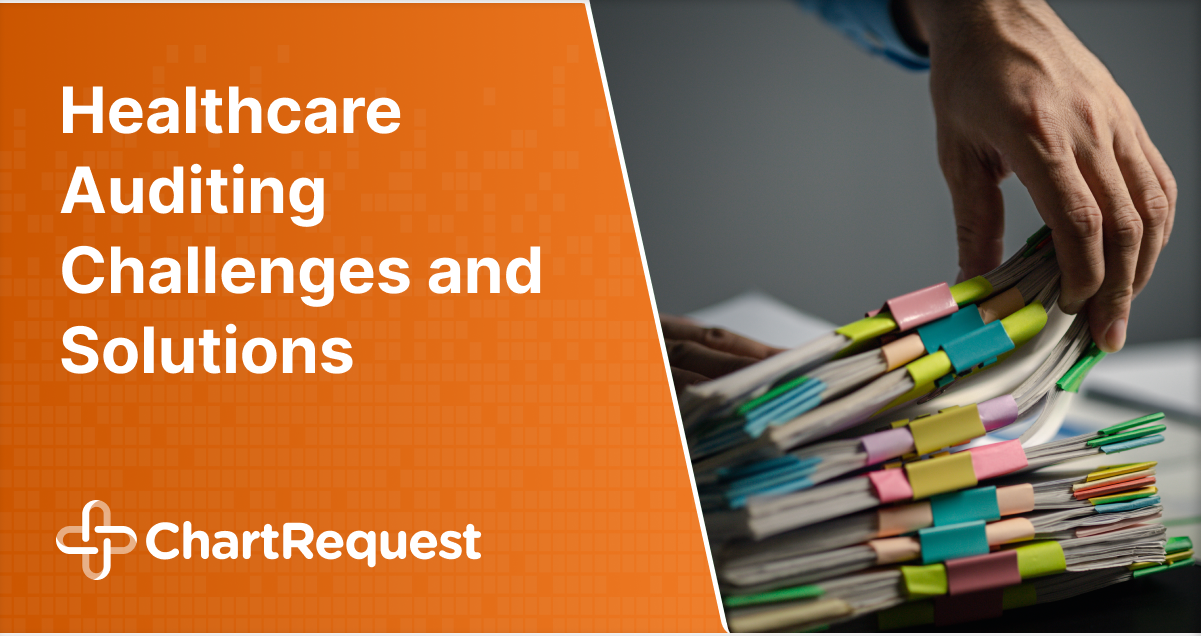Quality healthcare auditing is essential for maintaining your insurance company’s regulatory compliance and risk management. As care coordination becomes increasingly complex, routine audits help you ensure the accuracy of claims and prevent costly errors. However, these reviews often present challenges that can disrupt your staff’s efficiency and accuracy.
In this article, we’ll explore the top four challenges of conducting healthcare audits and provide actionable solutions to help you streamline your audit procedure.
Simplify your audit process with RecordGateway!
1. Data Management Challenges For Healthcare Auditing
Managing vast amounts of data from various healthcare providers is one of the biggest challenges during a healthcare audit. You might receive electronic health records (EHR) in incompatible formats with your existing data system. This problem creates data silos that will complicate your ability to organize and review information efficiently.
Despite widespread EHR adoption, 70% of doctors still rely on fax machines to exchange healthcare data. These solutions can create unnecessary bottlenecks when requesting thousands of medical records for an audit.
Consequences of Inefficient Data Management
Without the right data management system implemented, you might encounter several negative consequences:
Incomplete Data
Important details — like contact information and recommended treatments — can go missing when healthcare data resides in silos. These discrepancies can obscure your audit and lead to inaccurate claims assessments. Mistakes like these may cause your insurance company to pay members more than what it needs and contribute to a negative combined ratio.
Delayed Access
Gathering data from multiple EHR systems takes time. You might have to contact different healthcare departments or request records from various providers, which slows down your entire audit process.
Your company likely relies on healthcare auditing throughout the year. So, spending days on a single data request might cause an inefficient drain on workers and resources. You don’t want to fall behind on your audits — especially if state or third-party compliance policies require you to submit them on time.
Higher Costs
Effective healthcare auditing blends modern technology, expertise, data, and legal resources for success. The longer it takes to retrieve and organize information, the more resources you waste. Delays like this can increase operational costs and impact overall revenue cycle management.
Increased Risk of Errors
When data comes from various sources, inconsistencies are more likely to occur. Problems like duplicate billing or phantom billing may slip by without proper data management. About 46% of provider fraud cases stem from duplicate billing errors, which can lead to financial penalties or compliance issues during your audit.
Manage All Your Medical Records Requests on One Platform
Digital platforms like ChartRequest streamline data retrieval and aggregation to address the above challenges. RecordGateway for Payors plan automates the collection of records to ensure data is consistent, complete, and easily accessible.
2. Healthcare Auditing Compliance and Regulatory Hurdles
Keeping up with ever-changing regulations like the Health Insurance Portability and Accountability Act (HIPAA) and CMS guidelines may present ongoing challenges during healthcare auditing. Regulatory updates happen frequently, and you must stay informed to ensure compliance throughout the audit process. Failing to follow these rules can result in serious monetary and reputational penalties for your organization.
Non-compliance can negatively impact you in several ways, including:
- Costly fines that directly affect your bottom line
- Potential lawsuits or legal disputes, especially when dealing with protected health information (PHI)
- Audit rejections that force you to redo the entire process and delay results
Your organization must stay proactive and adaptable to regulatory changes. This approach is the best way to navigate healthcare auditing.
Stay on Top of Medical Records Retrieval Compliance With ChartRequest
ChartRequest’s automated compliance tracking helps insurance providers like you manage medical records retrieval regulations. This feature monitors regulatory updates like HIPAA and CMS guidelines to ensure alignment with the latest data-sharing standards.
3. Communication Gaps Between Insurance Providers and Healthcare Practices
Effective communication is the cornerstone of successful healthcare auditing. Unfortunately, poor communication between insurance providers and healthcare practices can cause unnecessary friction.
When insurance companies struggle to obtain records from providers, the audit process grinds to a halt. Prolonged auditing processes can diminish your negotiation leverage with providers, potentially resulting in less favorable terms and higher costs for future agreements.
Here are a few signs that communication gaps are impacting your auditing process:
- Delayed record request fulfillment leaves you waiting for critical information.
- Providers keep submitting incomplete or incorrect records, forcing you to follow up and re-request missing details.
- Misunderstandings in terminology or data requirements cause providers to submit incorrect or irrelevant information.
Audit season is inherently stressful, and communication breakdowns only add to your already heavy workload. RecordGateway platform for Insurance companies can unburden your team with the following:
4. Managing High-Volume Record Requests During Audits
Insurance providers often need help managing a large volume of medical record requests. This challenge compounds when tracking, verifying, and organizing records from multiple providers is resource-intensive. Each request involves intake, verification, retrieval, and documentation workflows.
Create Bulk ROI Requests With ChartRequest
ChartRequest understands your unique situation when requesting medical records, so we created an adaptive solution to support your operations.
Our bulk upload request feature lets you request multiple records in one batch. You can get records from different providers to save you time and reduce administrative workload during extensive audits.
You can also find specific records with advanced search and filter tools, streamlining your review process.
Boost Your Healthcare Auditing Efficiency With ChartRequest
Don’t let healthcare auditing present challenges for your insurance company.
ChartRequest streamlines data management, improves provider communication, and automates record requests, making audits faster and more efficient for our partners. We designed our platform specifically to save you and your staff time and reduce phone calls with providers by up to 90%.
Want to see how we do it? Schedule a RecordGateway consultation with our team today!


